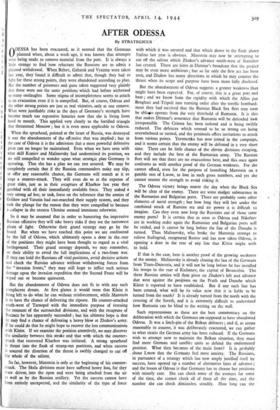AFTER ODESSA
By STRATEG1CUS
ODESSA has been evacuated, as it seemed that the Germans planned when, about a week ago, it was known that attempts were being made to remove material from the port. It is always a little strange to find how reluctant the Russians are to admit a planned withdrawal. When Rzhev, Gzhatsk and Vyazma were taken last year, they found it difficult to admit that, though they had to fight for these strong points, they were abandoned according to plan. But the number of prisoners and guns taken suggested very plainly that these were not the same positions which had before withstood so many onslaughts Some stigma of incompleteness seems to attach to an evacuation even if it is compelled. But, of course, Odessa and the other strong points are just as real victories, only at one remove. What were justifiable risks in the days of Germany's strength have become much too expensive luxuries now that she is living from hand to mouth. This applied very clearly to the fortified triangle that threatened Moscow ; but it is even more applicable to Odessa.
When the spearhead, pointed at the heart of Russia, was destroyed it was the abandonment of the offmsive that was implied ; but in the case of Odessa it is the admission that a most powerful defensive pivot can no longer be maintained. Even when we have seen with what skill Koniev and Malinovsky had undermined its position, we are still compelled to wonder upon what strategic plan Germany is operating. That she has a plan we can rest assured. We may be completely certain that if the Russian commanders make any slip, or offer any reasonable chance, the Germans will snatch at it to stage a counter-attack. They will even do so at the expense of great risks, just as in their recapture of Kharkov last year they gambled with all their immediately available force. They staked a very strong ad hoc, or task, force on the inference that the armies of Golikov and Vatutin had out-marched their supply system, and they took the plunge for the reason that they were compelled to because a ,ollapse in the eastern Ukraine seemed imminent otherwise.
So it may be assumed that in order to hamstring the impressive Russian offensive they will take heavy risks if they see the narrowest gleam of light. Otherwise their grand strategy may go by the board. But when we have reached this point we are confronted by the fall of Odessa, which ultimately opens a door in the rear of the positions they might have been thought to regard as a vital battleground. Their grand strategy depends, we may remember, on their ability to avoid the full implications of a two-front war. If they can hold the Russians off vital positions, avoid decisive actions and check the Russian advance without withdrawing forces from the "invasion fronts," they may still hope to inflict such serious damage upon the invasion expedition that the Second Front will be wiped out or become quiescent.
But the abandonment of Odessa does not fit in with any such complacent dream. At first glance it would seem that Kleist is being left to do what he can without reinforcement, while Manstein is to have the chance of delivering the riposte. He counter-attacked south-west of Tarnopol with the immediate purpose of rescuing the remnant of the surrounded divisions, and with the recapture of Buczacz he has apparently succeeded ; but his ultimate hope is that he may find a chance of delivering a heavy blow at Zhukov's army. If he could do that he might hope to recover the lost communications with Kleist If we examine the position attentively, we may discover the similarity between this stroke and that with which the counter- attack that recovered Kharkov was initiated. A strong spearhead is thrust into the flank of strung-out positions, and when success is assured the direction of the thrust is swiftly changed to cut off the whole of the salient.
So far, however, Manstein is only at the beginning of his counter- attack. The Skala divisions must have suffered heavy loss, for they were driven, into the open and were being attacked from the air as well as by the Russian artillery. Yet the success cannot have been entirely unexpected, and the similarity of the type. of force
with which it was secured and that which drove in the flank above Stalino last year is obvious. Manstein may now be attempting to cut off the salient which Zhukov's advance south-west of Stanislov has created. There are hints in Dittmar's broadcast that the project may be even more ambitious ; but so far only the first act has been seen, and Zhukov has many directions in which he may counter the thrust when its scope and purpose have been more fully disclosed.
But the abandonment of Odessa suggests a greater weakness than 'might have been expected. For, of course, this is a great port and base ; and we know from the rapidity with which the Allies put Benghazi and Tripoli into running order after the terrific bombard- ment they had received that the Russian Black Sea fleet may soon be able•to operate from the very threrhold of Rumania. It is this that makes Dittmar's assurance that Rumania will be defended look irresponsible. The Crimea has been isolated and is being swiftly reduced. The defences which seemed to be so strong are being overwhelmed or turned, and the peninsula offers invitations to attack from various points. Yeremenko has now joined in the campaign, and it seems certain that the enemy will be defeated in a very short time. There can be little chance of the eleven divisions escaping, and they include the best of the Rumanian army. The Russian fleet will see that there are no evacuations here, and this once again confronts us with another proof of the German weakness. For she cannot afford, even for the purpose of launching Manstein on a gamble east of Lwow, to lose in such gross numbers, and yet she cannot muster the strength to avoid risking it.
The Odessa victory brings nearer the day when the Black Sea will be clear of the enemy. There are some midget submarines in the Rumanian and Bulgarian ports. There are probably some other elements of naval strength ; but how long they will last under the combined attack of Russian sea and air power it is difficult to imagine. Can they even now keep the Russians out of those same enemy ports? It is certain that as soon as Odessa and Nikolaev are in working order again the Rumanian and Bulgarian ports will be raided, and it cannot be long before the line of the Danube is turned. Thus Malinovsky, who broke the Manstein attempt to relieve Stalingrad, recaptured Rostov and has now taken Odessa, is opening a door in the rear of any line that Kleist might wish to hold.
If that is .the case, here is another proof of the growing weakness of the enemy. Malinovsky is already chasing the last of the Germans from Trans-Dniestria, and it will not be long before he has installed his troops in the rear of Kichenev, the capital of Bessarabia. The three Russian armies will then pivot on Zhukov's left and advance due west against the positions on the Pruth and Danube which Kleist is reported to have established. But if any such line has been created, what will be its value now that it is liable to be turned from the south? It is already turned from the north with the crossing of the Sereth, and it is extremely difficult to understand how Rumania can be blind to the writing on the wall.
Such repercussions as these are the best commentary on the deliberation with which the Germans are supposed to have abandoned Odessa. It was a linch-pin of the Balkan defences ; and if, as seems reasonable to assume, it was deliberately evacuated, we can gather to what straits the German army has been reduced. If the Germans wish to attempt now to maintain the Balkan situation, they must find more German and satellite units to defend the undermined position. What then becomes of the main front? It is probably about Lwow that the Germans feel most anxiety. The Russians, in pursuance of a strategy which has now amply justified itself by success, have opened up a number of alternative lines of advance ; and the lesson of Odessa is that Germany has to choose her pOsitions with miserly care. She can check some of the avenues for some of the time, she cannot check all of them all the time, and the number she can check diminishes steadily. How long can she maintain her grand strategy under such a strain? How long can she shore up the Galician front and the Balkans without drawing upon the forces allocated to the "invasion fronts "? It is possible that the development of Manstein's thrust at Buczacz may throw some light on these doubts. Will Germany find she has sacrificed Odessa in vain?
General Montgomery has said that the Second Front has "already begun," and, of course, it is true that the damage the Allies are daily inflicting upon the enemy industry and the communications that males its products available could only have been possible, even a generation ago, after a victorious ground-invasion. The strain is gathering way every day ; but the Second Front will sooner or later be established in Western Europe, and only then will it move to its climax. For the present we are spectators of a very remarkable development of a very remarkable campaign. Even that has not reached its climax yet. It moves with astonishing speed, steadily opening fresh vistas, daily taking toll of the enemy's diminishing strength; but such events as the fall of Odessa show with what apparent ease the dramatic may emerge from what has long been a rout:ne. Odessa marks a stage in the collapse of a mighty army.



























 Previous page
Previous page